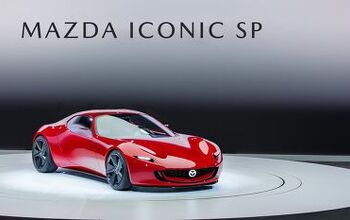Hyundai To Sell 3.8 Liter V6 and 2.0 Liter Turbo Four As Crate Engines
Hyundai used the SEMA show to announce a new crate engine program starting in December that will offer the company’s Lambda 3.8-liter, direct-injected V6 and Theta 2.0-liter, turbocharged 4-cylinder engines to aftermarket tuners at significant discounts over the cost of similar replacement engines.
The four cylinder will be available in two configurations, a turbo ready engine priced at $4,500 and one already equipped with a turbocharger, intercooler and intake ducting, priced at $6,000. The 3.8L V6 is priced at $9,000. For comparison, the Ford 2.0-liter EcoBoost 4-cylinder engine with similar power output as the Hyundai 2.0 liter motor has an MSRP of $8,000. The crate engines are covered by Hyundai’s 12-month/12,000 mile replacement parts warranty not the company’s well-known 10-year/100,000 powertrain warranty on new Hyundai vehicles.
Both engines come with intake manifolds, ignition coil packs, injectors and fuel rails. The turbo ready four was developed for those tuners planning to use larger turbochargers than the stock unit.
While we don’t normally lift quotes straight from a press release, we found Hyundai CEO John Krafcik’s remarks rather interesting, given the fact that most OEMs willfully ignore the aftermarket and tuner market beyond cursory show cars at SEMA
“As more Genesis Coupes have entered the pre-owned enthusiast market since its 2009 launch, we’ve witnessed strong interest in leveraging the low cost potential of this rear-drive platform and its powertrains for the tuner market and motorsports…Now, with our new crate engine program, Hyundai is making it more affordable for these same enthusiasts to modify their Genesis Coupe, or perhaps inject some high-value horsepower into other platforms.”
While engines like the Ford Coyote and Ecoboost motors and the Chevrolet LSx have cult followings in the aftermarket community, there is little in the sport compact market that is comparable, with the LSx itself being a darling of certain portions of the import community. Perhaps Hyundai is looking to corner that market with a non-American alternative.
More by TTAC Staff
Latest Car Reviews
Read moreLatest Product Reviews
Read moreRecent Comments
- Fred I had a 2009 S-line mine was chipped but otherwise stock. I still say it was the best "new" car I ever had. I wanted to get the new A3, but it was too expensive, didn't come with a hatch and no manual.
- 3-On-The-Tree If Your buying a truck like that your not worried about MPG.
- W Conrad I'd gladly get an EV, but I can't even afford anything close to a new car right now. No doubt if EV's get more affordable more people will be buying them. It is a shame so many are stuck in their old ways with ICE vehicles. I realize EV's still have some use cases that don't work, but for many people they would work just fine with a slightly altered mindset.
- Master Baiter There are plenty of affordable EVs--in China where they make all the batteries. Tesla is the only auto maker with a reasonably coherent strategy involving manufacturing their own cells in the United States. Tesla's problem now is I think they've run out of customers willing to put up with their goofy ergonomics to have a nice drive train.
- Cprescott Doesn't any better in red than it did in white. Looks like an even uglier Honduh Civic 2 door with a hideous front end (and that is saying something about a Honduh).


































Comments
Join the conversation
Great, now I have an idea of swapping in the turbo four and six speed manual out of a Veloster Turbo into my parents' 2000 Elantra wagon or using this turbo engine and said transmission... A 13 year old compact grocery getter that weighs 3000 pounds with 300HP that could probably still get 30MPG, I'll take it!! (The "moral" here is, even if they only sell two of these crate engines, they've spawned plenty of ideas like this one).
Will the 2.0 turbo fit my wife's Tucson?